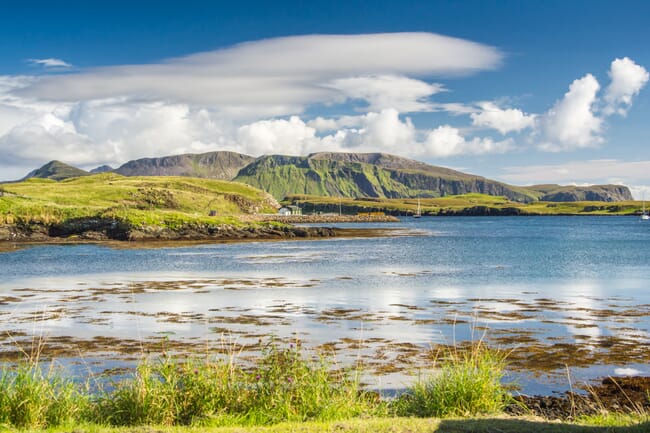The plans would allow Mowi to mothball existing sites in Loch Ewe and Loch Duich – which the company has itself admitted as being contentious – in favour of a more open ocean location. It would also potentially provide jobs for the island, which has a population of 18 people.
However, having assessed a ‘scoping document’ submitted by Mowi to the Highland Council, the Trust "concluded that not only are there ‘deficiencies’ in the information provided but that the threat posed to the marine environment and tourism economy of the Isle of Canna is unacceptable."

The NTS, which was given the island by the Gaelic folklorist John Lorne Campbell in 1981, highlighted their key concerns in a letter to the Highland Council, flagging up (in the Trust's own words):
- The level of risk posed to the marine environment within a new and untested regulatory framework
- The proposed location of the fish farm in what is biologically ‘the richest part of the Small Isles Marine Protected Area’, as well as two Special Protection Areas, representing ‘the worst location that could have been chosen in this respect’
- The potential impact on protected and extremely rare marine wildlife
- A projected biomass of 2,500 tonnes of salmon in open pens that would produce organic waste (mainly faeces) – on a par with a town of 33,000 people (for contrast, Oban’s winter population is 8,500 and in the summer is 25,000)
- The inadequacy of Mowi’s assessment to accurately determine the effects and spread of this waste
- The potential of rats being reintroduced to the Isle of Canna by associated shipping, thereby threatening important seabird populations
- The proximity of a protected seal haul-out site and Mowi’s proposition that they would potentially have to shoot seals to protect their stock
- Despite Mowi’s assurances that ‘Organic principles’ would govern the running of their facility, current certification given by the Soil Association would permit therapeutic anti-sealice chemicals that have ‘seriously detrimental impacts on marine wildlife’ to be used up to twice a year
- The potential threat posed by elevated numbers of sealice to wild salmon and sea trout up to a 35km radius as well as migrating past the proposed farm site
- The potential major landscape impacts on the onshore setting of the island of Canna by associated buildings and industrial structures
- Mowi's misleading underestimate of the number of boats and cruise ships which call into Canna and on which the tourism economy depends – the presence of pens and infrastructure would impede sea access and prevent larger ships from anchoring and manoeuvring
- The potential longer-term impact on a visitor economy that is dependent on the island’s natural beauty, beaches and peacefulness.
Stuart Brooks, the trust’s head of conservation & policy, said in a statement: “Based on the information provided by Mowi so far about their fish farm proposals, we have no confidence that their plans would not undermine, if not destroy, the very things that make Canna so important.
“In all conscience, we cannot support Mowi’s proposals. We would be failing in our core purpose as a conservation charity if we did, as well as betraying the wishes of John Lorne Campbell, who donated Canna and Sanday to our care."
The Isle of Canna Community Development Trust, meanwhile, has yet to take an official stance over the proposal – which is the third of its kind made by Mowi in the last decade.


